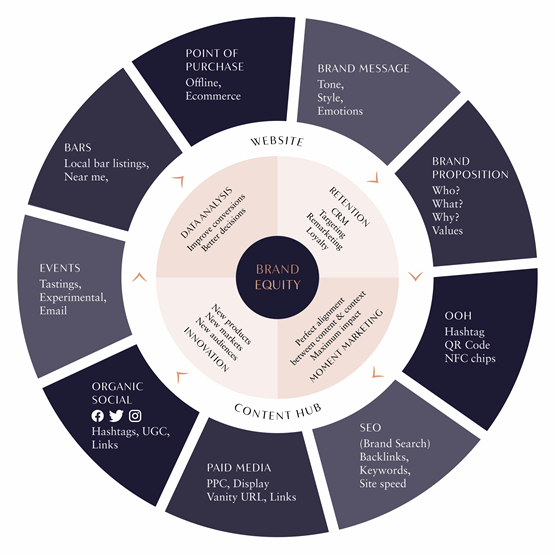At this point it would be cooler of me to just drop the mic. But sadly I’m not that brave.
I’m assuming you’ve all heard about COVID and most of you will know what effect it’s had on the economy. There have been winners and losers, there’s no doubt about that and we all know who they are or have our own opinions based on our own emotional bias.
Sectors have been demolished by it and others have sprung from no-where, some have prospered as a result of pivoting, being innovative and fast to respond.
Now the second lockdown is in full swing the winners are ready, already completed the dress rehearsal, well practiced and seasoned in the new norm. They’ve used their time wisely and are now in a position to adapt their approach to COVID by simply building off the momentum created in the first round, moving into the second wave as a true force to be reckoned with in their sector.
Meanwhile, the companies who did nothing, no pivot, no innovation, nothing new apart from possibly pause their activity to save their budgets are now exposed and so far behind we wonder if they’ll ever catch up.
Visualise this.
A bowling ball smashing down skittles - strike! Because for some global brands that’s how it’s going to feel, where’s it come from? Why are we down here? Bruised, confused and scratching their heads unless they roll up their sleeves and get with the programme, now.

Omnichannel brand wheel
Omni-channel marketing has been a massive topic within marketing for a decade. Retail experts brought it to our attention in 2010.
It’s about providing an experience — the omni-channel customer experience — transcending any one medium and simply providing shoppers what they want, when they want.
Consumers are moving away from the need to touch or try before they buy. Their research is subconsciously delivered via social channels and lifestyle content which completes the product endorsement, supported with a one-click to buy feature.
Yes, shoppers behave differently now, especially those under 30.
So, what are the blockers? Why are big companies with money, weight, influence, power and you’d expect resources, still not joining up their marketing channels and optimising their ROI?
#1: "We’ve always done it like that…"
Yeah...but since then we’ve had a pandemic which drove customers globally online for everything even toilet roll…and by the way, why were you still doing it like that?
Rather than doing the basics properly and improving their performance vast amounts of money has been spent on fiddly bits and trendy things and shiny stuff that have fizzled and not contributed to the bottom line. So the powers that be have written off further investment in digital as not working.
Huge amounts of money are being spent on advertising channels that are still almost impossible to prove effectiveness and ROI, but they are good for ego, so that’s ok then.
Silos between agencies, brand teams, commercial teams make end to end campaigns like the holy grail.
#2: "We’ve been thinking about it and been asked by the board to work up a business case for investment"
Ok, rewind...yeah maybe if we were in 2013, just developing our product lines and all investment was being sucked up trying to get into the big retailers.
But it’s 2020, you’ve got money we all know you do. Why are you worried about potentially wasting money on omni-channel, joining up your marketing channels to be more effective, making better decisions, innovation, being more agile and (as we’re dealing with people that are stuck in the 80’s) get more bang for your buck?
C-Suite I’m talking to you now...Why do you think it’s a better idea to ask your team to spend seriously valuable time putting together a document which will basically say...if we don’t do this now we may not have a business. Rather than just get the investment signed off so you can start talking about how it’s going to be spent.
If you need evidence of the ROI of running a programme like this then there are loads of published reports from reputable companies.
#3: "We don't have the skills"
This is one that we could discuss for hours...and there are many different opinions on this but seeing as this is being written by me I’ll give you my take on it.
Remember the saying ‘Jack of all trades, master of none’? I do, because it used to keep me awake at night. I moved from TV, to digital to creative, back to digital...have spent half my career client side and the other agency side. And you know what? My master of none is serving me well now. I don’t need to analyse the data to know it needs analysing or what answers we can get from it.
I know which purpose each channel solves within the funnel and I’m channel agnostic. Instead, I like to take a challenge, set the KPIs and write the strategy which will be multifaceted and integrated. Then work with an agency or team to work out the finer points.
While we are all obsessed with up-skilling our teams to be digital, we’ve lost sight of actually what we need which is people who think and work strategically. Trying to upskill your teams now, particularly in being able to deliver effective digital campaigns is never going to happen. Their skills will constantly be behind those who have been doing it for years.
So instead of that, get people working on their strategy skills and working in collaboration, out of silos and when to ask a silly question without being embarrassed because actually it’s time to cut the crap and work smart.
#4: "We’ve tried to change but it’s not worked"
One of my favourite projects was with a global pharmaceutical company who were working on improving their digital analytics maturity. It was great for many reasons, but most of all because they were open and honest about the problems in the business, they truly believed the core values of the business and pulled the right people into the project team from various departments to listen from the start.
They knew that they needed buy-in from the local markets from the get go if they were going to change the culture in the business and get people thinking more strategically and to a degree not be so wasteful. Reinforcing the message that knowledge share and being consistent actually makes their budgets go further.
The project was change management and internal communication but the execution used digital marketing strategies.
So what's next then...how do you kick this off? Again you’ll find lots or content around this on your networks. But this is where we’d start.
Vision/Purpose
Reaffirm your company vision, a lot has happened and things might have changed or become foggy for some. Review it, reaffirm and start communicating it with your employees.
Involve the right people
For this to work you need to create a task force. They need to be an equal mix of IT, marketing, brand, sales, HR and trusted agencies (Global and Local). Your agencies are your subject matter experts and as far as I’m aware, would be only too happy to consult early on in the process.
Set KPIs and develop the strategy
What’s the ultimate goal? Whatever you decide it is, measure it, benchmark, target. Develop the strategy to suit, put a plan together and then communicate it to the whole workforce with specific workshops or conferences for the teams that will be directly affected.
Give it a project name or brand and use all the usual awareness techniques. Quite like the ‘Nudge’ approach here...little posters in lifts at the coffee stations keep it fun and frequent.

Nudge marketing example - A reminder that using smaller plates helps with weight loss.
Select the right tech stack
What do we need to achieve this? Some opt for an all in one enterprise solution, most piece something together so you can select the best in class in all cases. But everyone working on the same tools globally is the panacea here - so that if Geoff has a question about his email marketing campaign in the US he can ask Syra in Denmark who has had the best email ROI within the organisation.
Training
Help sheets, workshops, webinars, select ambassadors, create a hub of content to support the use of the tools and the processes that are involved - again promote internally.
Tiered roll out
Pick a team that is one of your biggest or most active markets and then use them as your case study. Test the processes, the tech stack and the training documentation. So you have the time to make changes where necessary.
Teams will need to change their old habits and develop new ones so you’ll need to support long enough for the habit to set in. Don’t leave too soon or they’ll slip back.
It’s a big task, there’s no denying it but once you’re there and your realise that there are so many things you can do to improve your marketing performance that the knee jerk to spend huge budgets on shiny things and fiddly bits will disappear, because you’ll realise it’s about doing the simple things well. And over time you’ll probably realise that all the money wasted on the shiny stuff has paid for the programme - a programme with a clear focus on efficiency and effectiveness that drives performance.
If you are looking for a digital marketing agency to help consult and support you with your omni-channel programme then get in touch. We live and breathe strategy and performance marketing and are only too happy to help you drive this forward.
Sorry for my chippy delivery at the beginning of the blog but it feels good to get it off my chest, so thanks for reading :)




